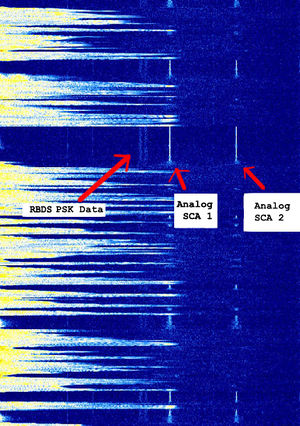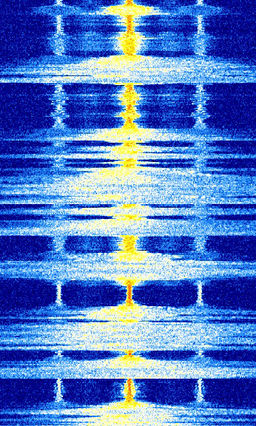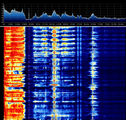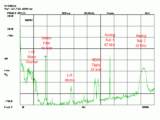FM Broadcast Radio
| Broadcast | |
|---|---|
| Analogue Radio: AM radio - FMFrequency Modulation radio Digital Radio: DRM - DAB |
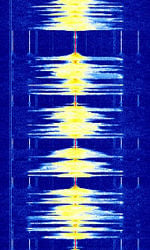 | |
|---|---|
| Frequencies | 65 MHz,108 MHz |
| Frequency Range | 65 MHz - 108 MHz |
| Mode | WFM |
| Modulation | FM |
| ACF | — |
| Emission Designator | — |
| Bandwidth | 38 kHz,108 kHz,118 kHz,184 kHz,200 kHz |
| Location | Worldwide |
| Short Description | Commercial Broadcast FM radio stations. Used for the broadcast of many different radio programs, including music, news, sports, weather, and talk shows. |
| I/Q Raw Recording | Download file |
| Audio Sample | |
Commercial Broadcast FMFrequency Modulation radio stations. Used for the broadcast of many different radio programs, including music, news, sports, weather, and talk shows.
Bandwidth for Mono FMFrequency Modulation is 19 kHzKiloHertz (kHz) 10^3 Hz, with a stereo stream it raises up to 54 kHzKiloHertz (kHz) 10^3 Hz, if there is RDS the bandwidth is 59 kHzKiloHertz (kHz) 10^3 Hz, and if DARC is present it is 92 kHzKiloHertz (kHz) 10^3 Hz.
There are a number of variations on the subcarriers that are placed on some FMFrequency Modulation Broadcast channels. RDS (RBDS in North America), and DARC are some of the data-based subcarriers used to transmit information alongside the FMFrequency Modulation broadcast. The information includes station name, details of current programming, alerts, traffic information, and more. Broadcasting in stereo FMFrequency Modulation also uses subcarriers for left and right channels.
In addition, in North America, HD Radio by iBiquity (Now part of DTS) in-band on-channel (IBOCIn-Band On-Channel (IBOC) is a hybrid method of transmitting digital radio and analog radio broadcast signals simultaneously on the same frequency.) digital radio technology is broadcast on the outer sidebands of some FMFrequency Modulation radio stations. They have a distinctive look, two plateaus flanking the main FMFrequency Modulation analog signal.
North America[edit]
Sidebands[edit]
Here is a diagram showing the various subcarriers that exist on North American FMFrequency Modulation Radio Broadcasts:
And this is a MPX extracted sample from a radio station in the United States for comparison:
IQQuadrature signals form the basis of complex RF signal modulation and demodulation, both in hardware and in software, as well as in complex signal analysis. Samples[edit]
Here are 5 IQQuadrature signals form the basis of complex RF signal modulation and demodulation, both in hardware and in software, as well as in complex signal analysis. samples of the MPX Multiplexed FMFrequency Modulation spectrum.
Frequencies[edit]
- Common – 87.5 to 108 MHzMegaHertz (MHz) 10^6 Hz
- OIRT – 65 MHzMegaHertz (MHz) 10^6 Hz to 74 MHzMegaHertz (MHz) 10^6 Hz
- Japan – 76 MHzMegaHertz (MHz) 10^6 Hz to 90 MHzMegaHertz (MHz) 10^6 Hz
Subcarriers[edit]
| Data Subcarriers | Stereo FMFrequency Modulation Pilots |
|---|---|
Decoding Software[edit]
Can be decoded in most SDR spectrum analyzer clients.
Video Examples[edit]
- RTL-SDR Ezcap EZTV668, SDRSharp, WFM test
- RTLSDR WFM FM Broadcast With SDRSharp (SDR#)
- FM Broadcast RF spectrum waterfall
Additional Links[edit]
- Wikipedia FM Broadcasting
- FM subcarriers
- United States Federal Communications Commission SCA Subcarriers


